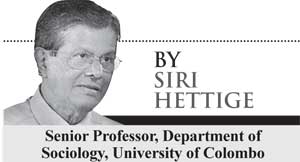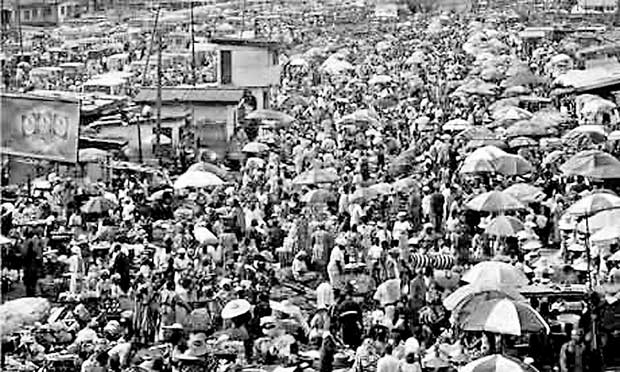Reply To:
Name - Reply Comment
 he worl
he worl d today can hardly be characterized as orderly. Yet, there appears to be some sense of order as most people carry on with their day to day activities, whether it is work, business, education, leisure or socializing. It is also clear that, despite this seeming orderliness, normal activities are often disrupted by natural disasters, conflicts, or political upheavals. In other words, order and disorder exist side by side and their sequence can change from time to time and from place to place.
d today can hardly be characterized as orderly. Yet, there appears to be some sense of order as most people carry on with their day to day activities, whether it is work, business, education, leisure or socializing. It is also clear that, despite this seeming orderliness, normal activities are often disrupted by natural disasters, conflicts, or political upheavals. In other words, order and disorder exist side by side and their sequence can change from time to time and from place to place.
Chaos or disorder is a manifestation of deep-rooted problems, lying under the surface and is part of the larger scheme of things in terms of human societal development unfolding over millennia, influenced by inherent qualities of human nature and deeper under-currents of human civilizations, the latter facilitated or disrupted by historical developments such as wars, invasions, colonization, population movements, revolutions and natural calamities.
Population is a key variable affecting the trajectories of human societies. The size and composition of human population can be influenced by religious dictates, state policy, and voluntary human action or natural disasters. Fertility and mortality rates have fluctuated in many parts of the world over a period of time due to various factors mentioned above and this is evident from demographic changes in different parts of the world. The overall trends in the recent decades are clear. The world population is still growing and is expected to increase from about seven billion today to about 10 billion by 2050. Increasing population pressure on non-renewable resources is more than likely to increase competition for such resources and this can lead to conflicts and even devastating wars. The adverse environmental impacts of increasing population pressure can also be quite destabilizing though some of these could be mitigated to a certain extent through far-sighted public policy and behavioral changes. However, the overall impact of population growth on a world-scale cannot be easily mitigated.

Inherent human capacity to think, express and act, rationally and emotionally, as well as individually and collectively, has given rise to cultures and civilizations in different parts of the world over several millennia. These cultures and civilizations have often encountered each other due to the expansion and mobility of populations, either looking for more space or resources, or simply to incorporate others into a particular world view, either religious or secular. There are many examples such as Roman, Islamic, Hindu, Chinese and more recent western Industrial civilizations. These have given rise to distinctive world views that in turn shape the lives of people who come under their influence in different parts of the world over time. Those who have internalized the core values, beliefs and ethos of distinctive cultures have often tended to treat them as absolute despite the fact that they all have dealt with the same existential issues that are common to human beings. Behavioural manifestations of such cultural differences at times give rise to powerful emotional reactions leading to violent conflict.
The steady expansion of the western industrial civilization across the world over the last several centuries, initially through colonialism, and in more recent times, due to the spread of capitalist production relations, has threatened to undermine the long held world views and traditional modes of life in many parts of the world. Though many people have easily adapted to the secular-materialist world view propagated by capitalist markets and other forces, those who have internalized traditional values and beliefs that are inconsistent with a secular materialist world view tend to resist the latter’s spread across the non-western world. While such resistance is clearly evident in a number of Islamic countries today, it is by no means confined to them. Fundamentalist religious movements in other parts of the world also tend to resist western secularism. These tendencies show the persisting significance of diverse civilizational under-currents that influence the thinking and behaviour of significant sections of the world population. Yet, what is noteworthy is that materialism has become such a pervasive influence across the world that most governments have adopted policies to accommodate rather than contain it. As a result, increasing consumption of material goods has become the dominant trend in almost all parts of the world.
So, in spite of the obvious adverse environmental and other impacts of increasing consumerism such as pollution, ill-health, depletion of non-renewable resources and global warming, not many governments have come forward to contain runaway consumption. Instead, powerful countries have tended to appropriate natural resources from all parts of the world to sustain and expand their domestic production systems. Such tendencies are not only likely to aggravate environmental problems but also lead to new political tensions and conflicts in the near future.
It appears that all major conflicts in the world today are caused by either diversity or inequality or both. While diversity here refers to divisions based on world views, beliefs and ideas, inequality refers to unequal distributions of material resources. Existing global mechanisms have become ineffective in resolving these conflicts as is clearly evident from many conflicts raging in different parts of the world. There are many examples of this in the recent history of the world.
There is no doubt that this would also be true in the future. So, it is always better to prevent conflict in order to avoid their many adverse impacts such as loss of life, displacement of people and destruction of property, quite apart from the hatred they generate in the minds of conflicting parties. It is the persisting hatred that often makes resolving conflicts more difficult.
It is in the above context that a more inclusive world view that helps humanity to move in the direction of a common future based on sharing and cooperation rather than exclusion and competition has become the need of the hour. The world today, characterized by cut-throat competition, obscene concentration of wealth in the hands of a few, exclusion, gross inequalities and conflicts is the opposite of a global order that the world leaders should strive to usher in for the sake of humanity. Yet, the inability of the world leaders to forge an effective, common front to face up to the challenge of climate change is indicative of the chances of the same leaders being able to evolve a global compact that can ensure peaceful coexistence of a world population which is highly divided in economic, political and ideological terms. Given the continuing failure of markets and states in the above regard, one can only wonder whether the people might have to hope for a worldwide social movement to facilitate the kind of social transformation needed.
The fast expanding global network society has the potential to facilitate worldwide exchange of ideas on the above lines but many good ideas are easily drowned in a sea of information that most human beings have no capacity to cope with.